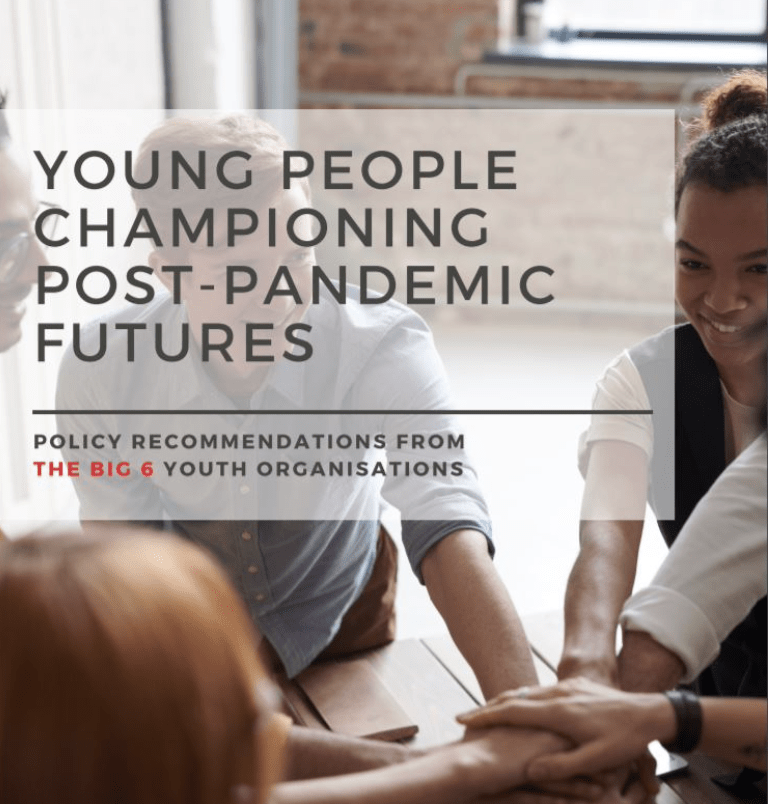Policy Recommendations for the Post-Pandemic Reality by Big 6 Youth Organisations

In December 2020, the Big Six– the world’s six largest youth organisations- called on the governments and policy makers around the world to put young people at the centre of the solutions while planning pandemic and post-pandemic recovery efforts. The emphasis is on creating a strengthened youth sector, critical to ensure that young people overcome the challenges and help the world in creating a better future.
The recommendations were made in the light of the COVID-19 pandemic of 2020 which created a huge impact on the education, employment, mental health and safety of young people, especially young women. The paper emphasises on the role of young people as first responders to the crisis, innovating solutions on ground to better handle the global pandemic.
Reflecting on the position paper “Young People Championing Post-Pandemic Futures”, Casey Harden, the General Secretary of World YWCA shared, “It is our human nature to be reactive in a crisis. Around the world, we have taken on collective response to the urgent crisis created by the COVID pandemic, leveraging technology, science, digital communication and cross sector cooperation. We must join the same way, with youth, to champion a post-pandemic future that leaves no one behind and specifically recognizes and addresses the generational inheritance of the pandemic impacts. The calls to action in the paper are a strong start.”
On December 14, the World Health Organisation announced the partnership with the Big 6 and the UN Foundation, “Global Youth Mobilisation for Generation Disrupted”, a USD 5 million initiative to provide seed-funding and invest in youth-led initiatives and solutions, and to organise national projects to encourage young people to provide support for recovery on ground.
The paper, as a joint call to action, on behalf of the children and young people of the world that comprise the Big 6 movements, focuses on the key challenges facing them as a consequence of the pandemic and recommends solutions to overcome these in order to prevent long lasting negative impact and involve young people to lead the recovery, making them the leaders of change. The paper concludes with a call for progressive funding towards these recovery efforts.
The Big Six Youth Organisations have issued the following key calls to action for policymakers:
- Ensure that children and young people from diverse backgrounds play a direct, active and powerful role in making decisions and developing policies that affect them and their future.
- Ensure equal access to healthcare for children and young people, regardless of background or employment status, with mental health as a key priority. If suitable approved vaccines will be made available, ensure free or low-cost vaccination schemes for vulnerable children and youth.
- Invest in more user-friendly, low-cost/high-efficiency systems to ensure children and young people have inclusive access to education, as well as in promoting digital inclusion and online safety.
- Promote digital safety and privacy as a fundamental human right, ensuring and maintaining a safe space for everyone irrespective of race, region, gender, sexual orientation, age, economic background and any other attributes.
- Prioritise upskilling and reskilling educational paths which promote skill development and vocational learning that will help future-proof careers. This includes competences around financial education, digital skills and civic skills.
- Promote active investment in building strong and resilient communities as a core element of public policies and programmes, with meaningful engagement of young people in this process.
- Ensure that children and young people are at the forefront of COVID-19 recovery programmes and policies, and that they are not disproportionately affected by budget cuts.
- Support youth- serving organisations at all levels (including grassroots organisations) during and after the COVID-19 crisis with increased funding or alternative funding schemes (including potential institutional support), ensuring the survival of the youth work sector.
- Adapt national and local youth policy to the new realities of digital and blended youth work.
World YWCA calls for YWCAs around the world to use the paper in their advocacy and planning efforts on ground, thereby emphasising on the critical need to have young people at the centre of decision making especially during the recovery efforts being planned by governments all around the world.